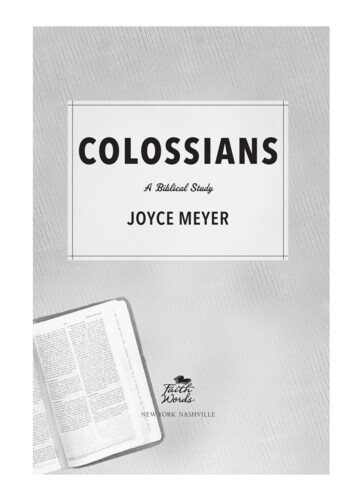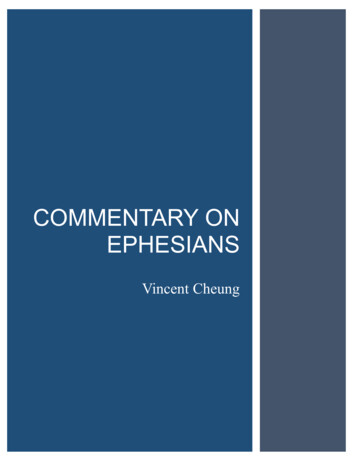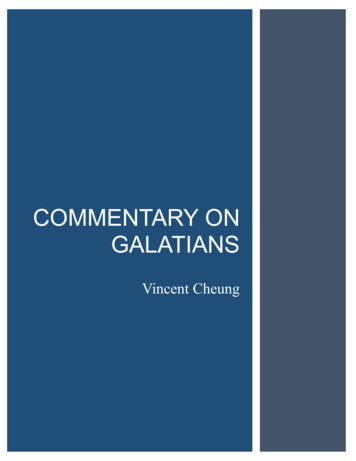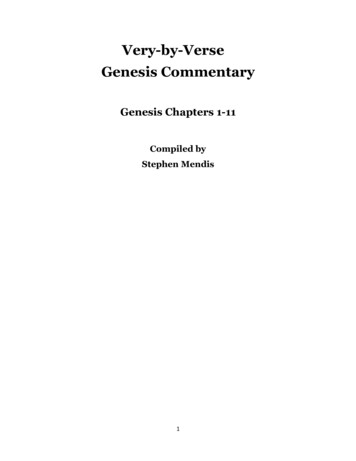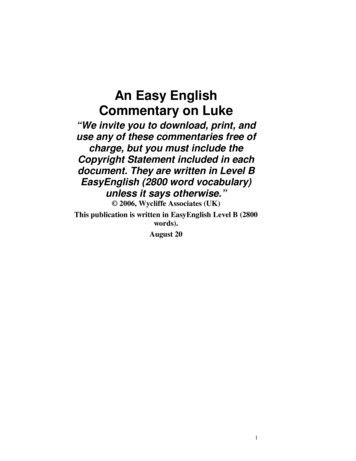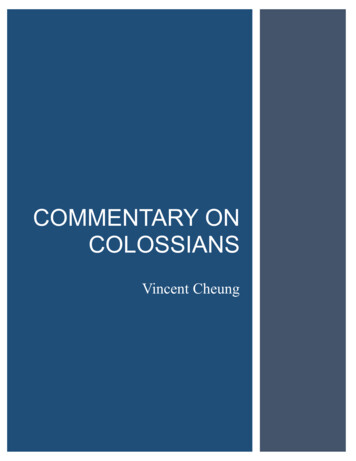
Transcription
COMMENTARY ONCOLOSSIANSVincent Cheung
Copyright 2008 by Vincent Cheunghttp://www.vincentcheung.comAll rights reserved. No part of this publication may be reproduced, stored, or transmittedwithout the prior permission of the author or publisher.Unless otherwise indicated, Scripture quotations are taken from the HOLY BIBLE, NEWINTERNATIONAL VERSION. Copyright 1973, 1978, 1984 by International BibleSociety. Used by permission of Zondervan Publishing House. All rights reserved.2
CONTENTSPREFACE . 4COLOSSIANS 1:1-2 . 5COLOSSIANS 1:3-8 . 8COLOSSIANS 1:9-14 . 15COLOSSIANS 1:15-23 . 32COLOSSIANS 1:24-2:5 . 75COLOSSIANS 2:6-23 . 85COLOSSIANS 3:1-4:1 . 95COLOSSIANS 4:2-18 . 1013
PREFACEPaul's letter to the Colossians is an impressive piece of writing that weaves together hightheology with holy living, and exhortations with warnings. One of its main themes is thefullness of Christ, and the fullness that Christians have in him. By this we mean that Christ'sperson and work are complete, and Christians have benefited from this completeness. Sincethis is the case, any attempt to supplement or replace the person and work of Christ is infact to undermine and devalue him, thus severely compromising the integrity of theChristian faith.This is possibly an occasional letter that Paul has written to combat a specific heresy thatlooms over the church. However, it is unnecessary to assume this background in order tofind the letter intelligible. This is because its positive exposition of sound doctrine is sorich, so broad and so deep, that it lends itself to universal application.This basic commentary provides some basic helps for understanding and appreciatingPaul's written address to the Colossians. In the process the reader will encounter ourdiscussions on several major, and at times controversial, doctrines and issues. Among theseare the incomprehensibility of God and the origin of sin and evil. Other features include asummary of systematic theology from the perspective of christology, discussions on trueversus false philosophy, true versus false spirituality, what it means to see the Father by"looking at" Jesus, the priorities of Paul in life and prayer, and the true nature of the GreatCommission.4
COLOSSIANS 1:1-2Paul, an apostle of Christ Jesus by the will of God, and Timothy our brother,To the holy and faithful brothers in Christ at Colosse: Grace and peace to you fromGod our Father.Since Paul's letter to the Colossians is considered a warning and corrective against a heresythreatening the church, we will begin with a brief word on the nature of occasional letters.As suggested by the word "occasional," these letters are "occasioned" – and written toaddress – particular needs, questions, threats, events, and so on. An occasional letterrepresents only one side of a conversation, and since the meaning of language depends oncontext, this could present difficulties in interpretation, especially when there is littleinformation concerning the issues that it is intended to address. For this reason, emphasisis often given to ascertaining the "missing" end of the conversation, and then ourinterpretation of the letter is made dependent on what we think we know about the purposefor which it is written.However, the difficulty that this poses to biblical interpretation is often exaggerated, andthus also the importance of access to this other end of the conversation. This is because thedifficulty is often sufficiently reduced and sometimes completely eliminated by thethoroughness of the side of the conversation that is before us.To illustrate, suppose someone asks me, "Can a non-Christian religion save a man from thewrath of God?" An answer of "no" is accurate, and as far as it goes, also sufficient. In thiscase, it is true that one who has access to only my side of the conversation – only the word"no" – could have no understanding of what the negative answer really means or what it isintended to address. Therefore, my answer would not teach such a person anything aboutChristian doctrine.But instead of a simple "no," I could say, "All men have fallen under Adam, and have fallenshort of God's righteous moral demands. But God ordained and sent Christ to take up ahuman body and to die for the sins of those chosen for salvation, so that all who receivethe sovereign gift of faith may be saved through him. Because redemption of the electthrough Christ is God's only plan of salvation, so that Christ is the only one who satisfiedthe wrath of God and redeemed the elect, the only way that any person can be saved isthrough faith in Christ." This much fuller reply is also accurate and relevant. And it isindeed possible that I would answer the question this way, that is, during those times whenI would not provide an even lengthier explanation.Without knowledge of the inquiry that occasioned my answer, although someone mightnot realize what question it is intended to address, I have filled my end of the conversation5
with so much information that the original question is practically dispensable in order tounderstand my statements. From my reply, one could make a possible reconstruction of theoriginal question, but it would be unnecessary to do so unless the aim is to reconstruct theentire exchange rather than to understand my side of the conversation.Further, not only is my answer intelligible in itself, it also provides ample information onChristian doctrine that can be affirmed and applied by someone unfamiliar with the originalexchange, but who has access to only my answer to the question. In fact, such an extensiveanswer by itself is more instructive concerning Christianity than if one were to have bothsides of the conversation but with only a simple answer – such as only the word "no" – onmy end of the exchange.We may also observe that just because my statements are formulated as an answer to aquestion does not mean that every detail in the answer must correspond to somethingmentioned in the question. For example, the idea of redemption is essential in my answer,but the question itself contains no concept of redemption. It does not ask whether we needredemption, or whether Christ is the only one who has redeemed sinners. That is, it wouldbe irrational to think that because the question contains no concept of redemption, thenneither can my answer refer to it, or that because my answer refers to it, then redemptionmust be first mentioned in the question.As in our own conversations, Paul's letters consist of much more than a "yes" here and a"no" there. They include extensive expositions of sound doctrine and thorough refutationsof his opponents. The issues being addressed are often stated, explained, or rephrased. Thedifficulty often associated with a lack of historical context in interpreting occasional lettersis an exaggeration because they contain so much positive information as well as direct andindirect indications concerning the issues being addressed that it is seldom a majorhindrance to possess only the letters, or this side of the conversation. A much greater threatto interpretation is the tendency of some to speculate about information that we do notpossess, instead of paying attention to the documents that we have right before us.There is some debate about the nature of the heresy that Paul's letter is supposedly writtento address. If we operate by the (unwarranted) assumption that every major issue Paulmentions in the letter is intended to counteract a corresponding element in the false doctrinethat he writes to address, then it would seem that the heresy contains a mixture ofmysticism, asceticism, Gnosticism, and Jewish tradition. Although Gnosticism was notsystematized until the second century, Gnostic tendencies have long infiltrated someschools of Jewish and Greek thought, so it is conceivable that Paul would have had tocombat them during his ministry.That said, as Paul does not directly refer to any heresy in the letter, some argue that he isnot writing to confront a specific threat at all. Perhaps it is just a general letter of instructionand exhortation, or at best the contents correspond, not to a specific heresy, but to thegeneral intellectual and religious culture that surround the Colossians.6
Just because Paul emphasizes the supremacy of Christ does not mean that there are falseteachers denigrating the sufficiency of Christ. Just because he sets forth an exalted andprecise Christology, insisting on both the divinity and humanity of Christ, does not meanthat there is a heresy that threatens either aspect of the doctrine. And just because he writes,"Do not let anyone judge you by what you eat or drink, or with regard to a religious festival,a New Moon celebration or a Sabbath day," does not mean that there are indeed individualsthere seeking to enforce these traditions. It is possible, but not necessarily true. The letterto Colossians is different from a letter like the one to Galatians, in which false teachers andfalse teachings are explicitly described.Thus although the presence of a heresy is possible, and may be employed as a practicalassumption in exploring the precise interpretation of the letter, there is no solid warrant toinsist on it. And if the assumption is false and interpretation is made to depend on it, thenthe result could be an inaccurate understanding of the letter. The point is that, in this case,Paul's side of the conversation is so extensive that no loss is suffered due to uncertaintyabout the situation at Colosse.Therefore, Barclay is mistaken when he writes, "These, then, were the great Gnosticdoctrines; and all the time we are studying this passage, and indeed the whole letter, wemust have them in mind, for only against them does Paul's language become intelligibleand relevant."1 On the contrary, the main ideas in the letter are intelligible and relevant toany ordinary reader even without any exposition, or any knowledge of ancient Gnostic andJewish thought. The assertion that it is necessary to read Paul's letter against thebackground of Gnostic doctrines is absurd and irresponsible.1William Barclay, The Letters to the Philippians, Colossians, and Thessalonians (Westminster John KnoxPress, 2003), p. 134.7
COLOSSIANS 1:3-8We always thank God, the Father of our Lord Jesus Christ, when we pray for you,because we have heard of your faith in Christ Jesus and of the love you have for allthe saints – the faith and love that spring from the hope that is stored up for you inheaven and that you have already heard about in the word of truth, the gospel thathas come to you. All over the world this gospel is bearing fruit and growing, just as ithas been doing among you since the day you heard it and understood God's grace inall its truth. You learned it from Epaphras, our dear fellow servant, who is a faithfulminister of Christ on our behalf, and who also told us of your love in the Spirit.Some people have an aversion to the word "religion" and prefer to have nothing to do withit. Among them, those who consider themselves Christians object to the word on the groundthat Christianity is not a religion but a "life" or a "relationship." But this disdain for theword is based on ignorance and false piety.First, we may question whether the words "life" and "relationship" are in fact adequatedescriptions of the Christian faith. The biblical account of this life and relationship is muchricher than what most people have in mind who prefer these words as descriptions of thefaith. In fact, Scripture includes many things in its exposition of this life and relationshipthat many of these people seek to exclude by their rejection of the word "religion."In Merriam-Webster, one main definition of religion is "the service or worship of God."This might seem too specific for some philosophers, but the average Christian could hardlyprotest against it. Even if the definition is insufficient, there is nothing repulsive orunspiritual about it. And of course, "the service or worship of God" can include the idea ofa life or a relationship, but it is also broad enough to include more, or more of the thingsthat are involved in this life or relationship.Then, a second definition is "a personal set or institutionalized system of religious attitudes,beliefs, and practices." This probably represents the idea of "religion" that many Christiansdisassociate with their faith or any legitimate spiritual life. However, there is nothinginherently wrong in this idea of religion; rather, we need to know what it is that has beenpersonalized or institutionalized. If it is a true religion, then it ought to be personalized. Ifthis true religion endorses a formal organization in its operations, then it ought to beinstitutionalized.To institutionalize something means "to incorporate into a structured and often highlyformalized system." This could be right or wrong, and the way it is done could also be rightor wrong. A "highly formalized system" could canonize a set of human traditions, resultingin the repudiation of doctrinal orthodoxy and spiritual liberty. However, the fault then liesin that which is formalized, and not the very idea of a formal organization. So even8
institutionalization has nothing inherently objectionable about it, nor is it necessarilyopposed to or by Christianity.Thus, for example, if it is not wrong for a believer to say that "Christianity is the only trueservice or worship of God," then it is not wrong for him to say that "Christianity is the onlytrue religion." There is likewise no problem with the first and second definitions inWebster's New World Dictionary: "belief in a divine or superhuman power or powers to beobeyed and worshiped as the creator(s) and ruler(s) of the universe" and "any specificsystem of belief and worship, often involving a code of ethics and a philosophy."If a person insists on a private definition of religion that renders it wrong or unbiblical, thenof course he should not apply it to Christianity, but he has no basis to impose such adefinition on other people. The point is that when we operate by the ordinary dictionarydefinitions, the statement "Christianity is not a religion" is false, and in fact unbiblical. Ofcourse Christianity is a religion. And if we operate by these definitions, then the personwho says "Give me Jesus, not religion" is telling us that he wants nothing to do with "theservice and worship of God."The needed distinction is not one between religion and relationship, since at least by theordinary dictionary definitions, a religion can sustain a relationship. Rather, the neededdistinction is one between good and bad religion, or true and false religion. Christianity issuperior to Islam, Buddhism, and others, not because Christianity is a relationship whilethese are mere religions. All of these are religions. The difference is that Christianity is trueand the rest are false. Christianity is a divinely revealed religion. It is God's own word onthe proper service and worship of God. All other religions are human and demonicinventions.So the crucial issue is not whether Christianity is a religion, but what kind of religion it is.One way that Scripture characterizes the Christian religion is with the words faith, love,and hope (v. 4-5).2 When subjective and emotional meanings are attributed to these words,they cannot convey anything substantial about Christianity or accentuate its distinctivefeatures against other religions and philosophies. But when understood according to theirbiblical usage, these words are able to embody some core aspects of the Christian religion,so much so that some writers have organized their dogmatics under them. Of course, thesame information can be presented in different ways in terms of structure and emphasis.3Faith is not general belief or confidence. Sometimes people are urged to "have faith"without mention of the content of this faith. Even unbelievers are encouraged to have faithin this sense. If this faith is intended to produce a desirable outcome or cause one's effortand stamina to prosper, then what is the basis for this confidence? "Faith" in this senseoften refers to nothing more than an irrational willpower or expectation.2Romans 5:1-5; 1 Corinthians 13:13; Galatians 5:5-6; Ephesians 1:15-18., 4:2-5; 1 Thessalonians 1:3, 5:8;Hebrews 6:10-12, 10:22-24; 1 Peter 1:3-8, 21-22.3See Vincent Cheung, Systematic Theology and Presuppositional Confrontations.9
Scripture speaks of faith in several ways. Here we will mention only two of its broadmeanings. First, "faith" can refer to the Christian religion itself, that is, the set of doctrinesand practices that define it, as when we say "the Christian faith" and "contend for the faith"(Jude 3). Or, "faith" can refer to one's personal belief in this religion, as when we say "havefaith in God" (Mark 11:22) and "we have heard of your faith in Christ Jesus" (Colossians1:4). This kind of faith is a gift from God, produced by his Spirit in those whom he haschosen. When we affirm the doctrine of justification by faith, we affirm that God saves usby giving us faith in Jesus Christ.As we discuss faith, love, and hope together, we are interested in this second sense of faith– it is "faith in Christ Jesus." There is the popular misconception that to "believe in" Godis not the same as to "believe that" what he has revealed about himself is true, that is, tobelieve these things "about" God. Sometimes the distinction is made between trust andbelief, or trust and assent. However, the proper distinction is one made between true andfalse faith, not "believe in" and "believe that" faith, or between trust and assent. It wouldbe absurd to say, "I believe in Christ, but I believe nothing about him" – to "believe in"Christ this way is meaningless. To have faith in someone is to believe something abouthim, and it is impossible to have faith in someone in a way that is beyond or other thanwhat we have faith in him about, or what we believe about him.It has been argued that the contents of "believe in" and "believe about" (or "believe that")are not necessarily identical since we believe certain things about a person that provide usa basis to "believe in" or "trust" him beyond what is immediately indicated by these thingsthat we believe about him. Unless "trust" refers to a blind assumption affirmed by sheerwillpower, in which case it is not biblical faith at all, to say that you "trust" God beyondwhat you believe "about" him is just to say that what you believe "about" him provides abasis for you to do this, which in turn means that this "trust" remains identical to what youbelieve "about" him. That is, the distinction or "distance" made between trust and assent isitself another object of assent. And this means that the distinction is in fact false and the"distance" between the two non-existent.Thus to say that we have faith in Christ is a shorthand for saying that we believe a numberof propositions about Christ. The word "faith" indicates the positive and desirable natureof the things that we believe about him, and to the extent that this faith is biblical, thesewould be biblical propositions.Just as Paul has in mind a faith that is specific – it is "faith in Christ Jesus" – he has inmind a love that is also specific – it is "the love you have for all the saints." Somecommentators remark that in this passage faith characterizes our "vertical" relationshipwith God, while love characterizes our "horizontal" relationship with other people. This istrue to the passage as far as it goes, but it would be a mistake to infer from this a broadprinciple that rigidly enforces the distinction. This is because, among other things, lovemust also characterize our vertical relationship with God.Although faith is sometimes associated with a feeling of confidence, it is not to be identifiedwith the feeling itself. Rather, faith is belief in divinely revealed propositions and it is in10
itself independent of feelings that may fluctuate. Feeling good about a biblical propositionis different from believing it. Likewise, although love is sometimes accompanied by certainemotions, love itself is not an emotion. The idea that love is either an emotion or necessarilyand proportionately associated with certain emotions has inflicted disastrous damages tothe intellectual and ethical development of countless believers.The Bible speaks of love as the disposition to think of and act toward other persons(including God) in accordance with divine precepts and laws – that is, to treat them as Godtells us to treat them. This love has no direct and necessary connection with any emotion,which without any inherent negative connotation, we define as a type of mentaldisturbance.4 This disturbance can be positive or negative, but it is a disturbance.As Paul writes in Romans 13, "The commandments are summed up in this one rule: 'Loveyour neighbor as yourself.' Love does no harm to its neighbor. Therefore love is thefulfillment of the law" (v. 9-10). Notice that love is the fulfillment and not the replacementof the law. We do not treat people with love instead of treating them according to the law.Rather, to treat them with love is to treat them according to the law, or God'scommandments.He says that the commandments, such as "Do not commit adultery" and "Do not murder,"are summed up in the commandment to love. A summary is not different from or superiorthan the things that it embodies. In fact, to truly understand the details represented by thesummary, one must examine the things that it summarizes. Thus the commandment to loveis not different from or superior than the other commandments – love is defined by thesecommandments in the first place.Scripture defines our love toward God in the same way. Jesus tells his disciples in John14:23, "If anyone loves me, he will obey my teaching" – not that he will feel a certain wayor have a certain emotion. If he loves, he obeys. Then he says, "My command is this: Loveeach other as I have loved you. Greater love has no one than this, that he lay down his lifefor his friends" (15:12-13). There is no emotion here. The command is to love, and thislove means heroic and sacrificial action for the benefit of others.Many people who feel thoroughly distraught inside at the slightest suffering in otherswould never sacrifice even their personal comfort to save them, not to say their very lives.But they have been taught – by culture, by tradition, by anti-Christian philosophies, but notby Scripture – that this represents compassion. They groan and weep for them – is this notlove? Although it might permit themselves to feel very compassionate and spiritual, it hasnothing to do with love.In their more sober moments, theologians and commentators admit that biblical love hasto do with thinking and acting in accordance with God's commands toward other persons,and that it has nothing to do with a particular kind of mental disturbance, or emotion. TheScripture is clear on this; it is not difficult to recognize. As one commentator writes, "The4Merriam-Webster's dictionary lists this as its first but "obsolete" definition.11
Bible speaks of it as an action and attitude, not just an emotion .Christians have no excusefor not loving because Christian love is a decision to act in the best interests of others."5Defining love as an emotion leaves one with an excuse, since our feelings could fluctuate.Moreover, such a definition generates unnecessary guilt in the person who does not alwaysfeel what he thinks he should feel toward people. And if love is an emotion, then exactlywhat emotion is it? That is, what should it feel like? But according to the Bible, if a personwill consistently treat other people in accordance with God's commands, regardless of howhe feels, then he walks in love. On the other hand, the person who does nothing more thancollapse into an emotional mess at any sign of human suffering does not walk in love. Heis an unloving nuisance, and he might as well stop pretending.Christian hope is also specific, a hope that is "stored up for you in heaven." We have seenthat faith can be used in an objective sense, as in "the Christian faith," or in a subjectivesense, as in "your faith in Christ." Likewise, there is an objective sense to hope, and thenalso a subjective sense. Even when used in its subjective sense, the hope of the gospel ismuch more than a general expectation of or desire for a positive future, or to wish forsomething. A mere wish often has no basis for its fulfillment, and outside of the gospelpromise, the nature of what is desired falls far short of the believer's inheritance in its gloryand purity. On the other hand, the Christian hope rests on the promise of God and the realityof redemption.In any case, whereas faith is used in the subjective sense in this passage, hope is used inthe objective sense – the significance of this will be noted in a moment. This is evidentbecause, first, a subjective hope is an attitude, condition, or disposition of the mind – again,not necessarily and proportionately connected with a disturbance of the mind, or anemotion – but here the hope is stored up in heaven, not in the mind. Second, Paul says theColossians "heard about" this hope, thus it is not something that is felt, sensed, opined, oraffirmed in the mind, but something proclaimed and described. And third, if we may equatewhat the believers have received in verses 5 and 12, then this "hope" is said to be an"inheritance," which is something objective, not subjective.Although this hope is stored up in heaven, so that the full benefits are reserved for a futuretime, through the Holy Spirit we now enjoy the powers of the age to come. Moreover, it isstored up in heaven not in the sense that it is kept from us, but that it is reserved for us. Itis not something that we wish for or work for – it is not a possibility but a reality. God hasforeordained our salvation, and nothing can take away our inheritance, because no one cansnatch us from the his hand. This objective hope is the foundation of our subjective faith.The significance, therefore, is that our faith is not based on presumption or possibility, butdestiny and reality.One way to use these three words to embody a course of dogmatics is to place the doctrinalaspect of Christianity under faith, the ethical under love, and the eschatological under hope.These distinctions are meaningful, but not precise or perfect, for both the ethical and5Life Application Bible Commentary: Philippians, Colossians, & Philemon (Tyndale House Publishers,Inc., 1995), p. 154.12
eschatological can also fall under the doctrinal, so that the entire religion can be called theChristian faith. Also, when used in this context, all three words would take on theirobjective senses.We say that the Christian religion is characterized by these three things, but do otherreligions also offer faith, love, and, hope? When properly defined, we see that they do not.Again, Paul does not refer to some general faith or belief without regard to its object. Thefaith here is "faith in Christ Jesus." If non-Christians could have faith in Christ Jesus in thesense specified in Scripture, then they would already be Christians. Non-Christians do nothave faith. And since love entails obedience to God's commands as they have been revealedin the Christian Bible, then no non-Christian religion, philosophy, or ethical view can offeror produce true love. Non-Christians do not have love. However, note that almost all ofnon-Christian philosophies – from Buddhism to Satanism – can contain love if it is definedas some sort of emotion. Then, our hope refers to the "inheritance" of the saints as promisedin Scripture, stored up for us in the heaven described in Scripture. It is specific andexclusive. Thus there is no faith, no love, and no hope except in the Christian religion.The Colossians' faith and love "spring from" the hope that is stored up in heaven, and theyheard about this hope "in the word of truth, the gospel" (v. 5). This gospel is a messageabout God's grace, bearing fruit consisting of faith, love, and hope once it is heard andunderstood (v. 6). And it is heard and understood when a person teaches it to an audience(v. 7).Because the Christian faith is transmitted when it is explained and understood, it isintellectual in nature. We can think about it, and talk about it. We can explain it, and wecan understand it. The idea that faith is "caught, not taught" is against the whole spirit ofthe Christian religion, and is also an assault on the verbal revelation of Scripture. True pietybegins and grows in precisely the opposite manner – it is taught, not caught. The idea thatGod's grace is beyond our understanding comes from false humility and a rejection of then
This basic commentary provides some basic helps for understanding and appreciating Paul's written address to the Colossians. In the process the reader will encounter our discussions on several major, and at times controversial, doctrines and issues. Among these are the i
